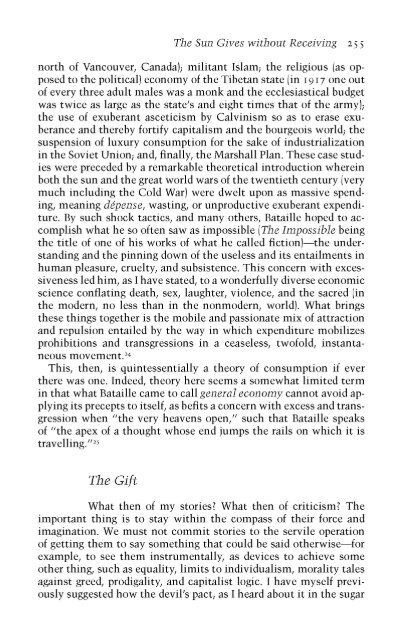The Devil and Commodity Fetishism in South America - autonomous ...
The Devil and Commodity Fetishism in South America - autonomous ...
The Devil and Commodity Fetishism in South America - autonomous ...
Create successful ePaper yourself
Turn your PDF publications into a flip-book with our unique Google optimized e-Paper software.
Pollution, Contradiction, <strong>and</strong> Salvation 119<br />
taneously: a system of reciprocity <strong>and</strong> self-renewal together with a<br />
system of unequal exchange <strong>and</strong> self-ext<strong>in</strong>ction.<br />
This structure of opposition can also be seen with<strong>in</strong> the peasant<br />
sphere of production. It st<strong>and</strong>s out clearly <strong>in</strong> the opposition between<br />
women <strong>and</strong> men <strong>in</strong> the procreation of children <strong>and</strong> <strong>in</strong> the rejection<br />
or acceptance of the technology of the "green revolution," which is<br />
replac<strong>in</strong>g traditional practices. <strong>The</strong> obligation to raise the children<br />
falls to the women, but the children reciprocate that care later <strong>in</strong><br />
life; while the fathers are referred to as flies, "those who st<strong>in</strong>g, <strong>and</strong><br />
fly away, leav<strong>in</strong>g their eggs <strong>in</strong> old meat." <strong>The</strong> few advocates of the<br />
techniques of the green revolution <strong>and</strong> the further commercialization<br />
of peasant agriculture are men. <strong>The</strong> women bitterly oppose the<br />
uproot<strong>in</strong>g of the perennials that such an <strong>in</strong>novation requires. "<strong>The</strong>y<br />
give us little, but they give!" say the women, who are alienated from<br />
the new technology. Only men drive <strong>and</strong> own tractors, <strong>and</strong> men are<br />
favored for loans <strong>and</strong> deal<strong>in</strong>gs with the government. Women fear the<br />
new f<strong>in</strong>ancial ties, fear <strong>in</strong>debtedness, <strong>and</strong> fear a mode of cash cropp<strong>in</strong>g<br />
that provides <strong>in</strong>come only once or twice a year, if at all. <strong>The</strong>y<br />
fear that their offspr<strong>in</strong>g will die of hunger while wait<strong>in</strong>g for the harvest,<br />
<strong>and</strong> they fear the eventual loss of their l<strong>and</strong>. <strong>The</strong> developmental<br />
cycle of the peasant household focuses on the reproduction of the<br />
maternal l<strong>in</strong>e. As a young household grows older, the proportion of<br />
females liv<strong>in</strong>g <strong>in</strong> it <strong>in</strong>creases, concentrat<strong>in</strong>g women <strong>and</strong> l<strong>and</strong> <strong>in</strong>to<br />
one productive unit. Males move <strong>in</strong>to extrahousehold occupations<br />
<strong>and</strong> residences, while the women cl<strong>in</strong>g to the cultivation of the perennials.<br />
Women lend <strong>and</strong> receive between households <strong>and</strong> manage<br />
the distribution of foodstuffs. Through the women households are<br />
sewn together by the ties of children from many fathers. Both the<br />
pattern of material production to which women wish to adhere <strong>and</strong><br />
the social pattern of reproduction of offspr<strong>in</strong>g <strong>in</strong> which they are implicated<br />
are cyclical, self-perpetuat<strong>in</strong>g exchange structures. However,<br />
the male peasants' pattern of exchange, <strong>in</strong> both procreation <strong>and</strong><br />
<strong>in</strong> the new mode of material production that they espouse, is far less<br />
cyclical <strong>and</strong> reciprocal <strong>and</strong> tends to the extreme portrayed by the<br />
male proletarian devil contract—the exchange that ends all exchange.<br />
But only when the region is considered as a whole is this antithesis<br />
clearly established, starkly experienced, <strong>and</strong> projected <strong>in</strong>to the<br />
contrast between peasant household<strong>in</strong>g <strong>and</strong> agribus<strong>in</strong>ess production.<br />
A preexist<strong>in</strong>g pattern of ideas immanent <strong>in</strong> culture, if only<br />
barely <strong>and</strong> confusedly borne <strong>in</strong> consciousness, is all the more securely<br />
fixed by the new experience which threatens the roots of that<br />
pattern. <strong>The</strong> experience, as Levi-Strauss suggests, would rema<strong>in</strong> <strong>in</strong>-
















